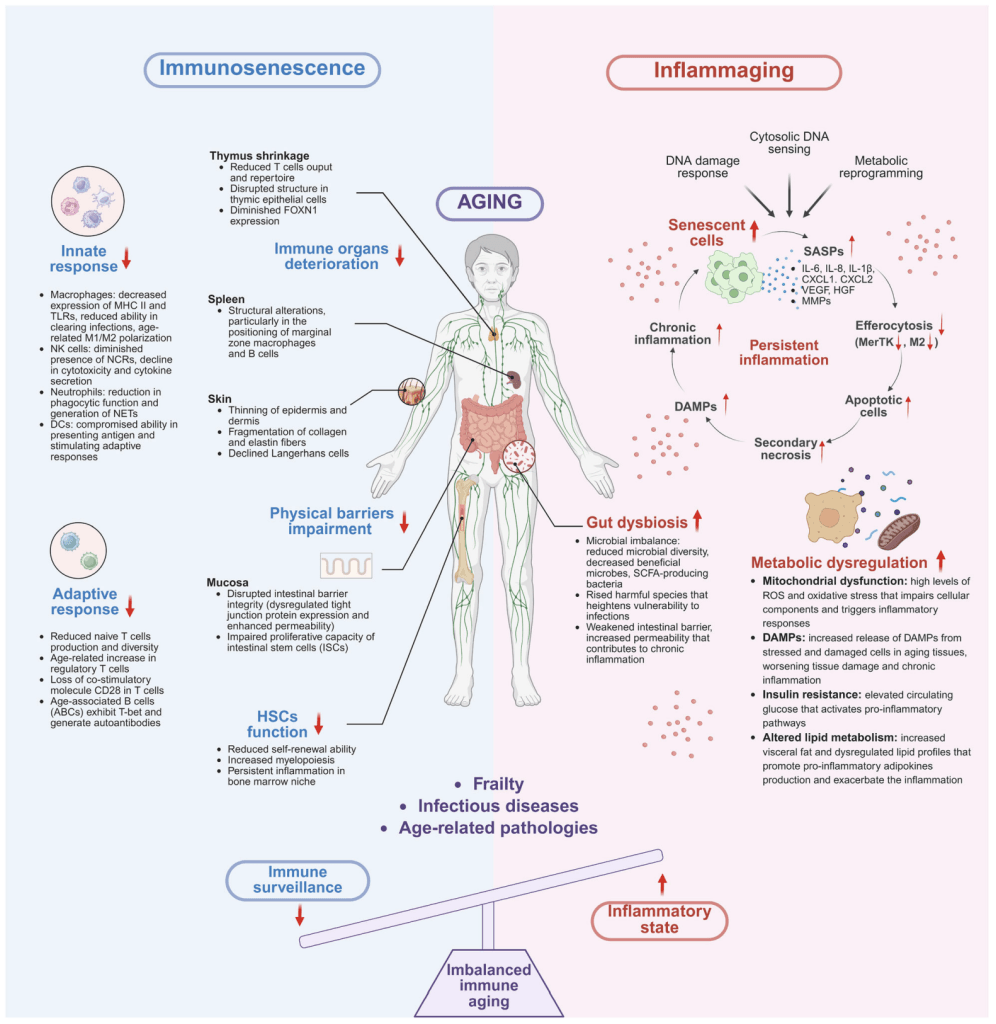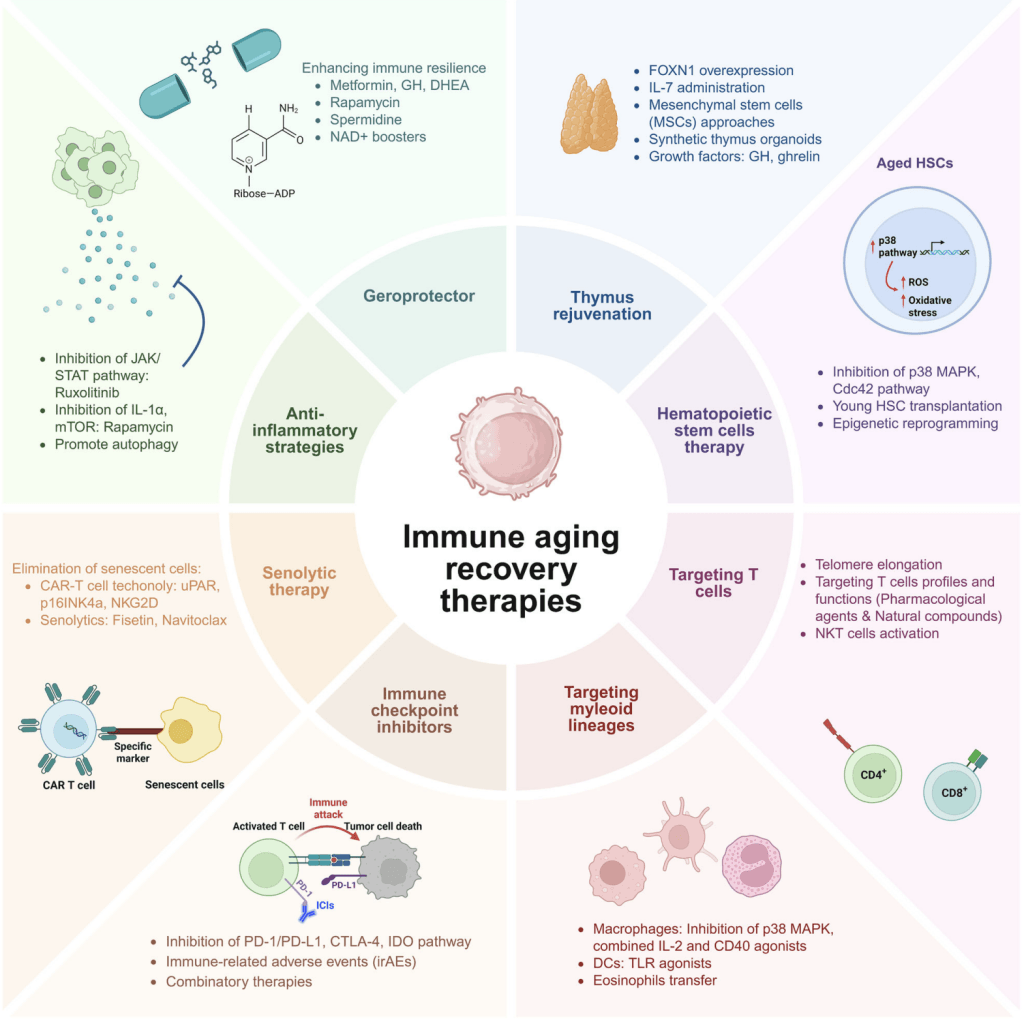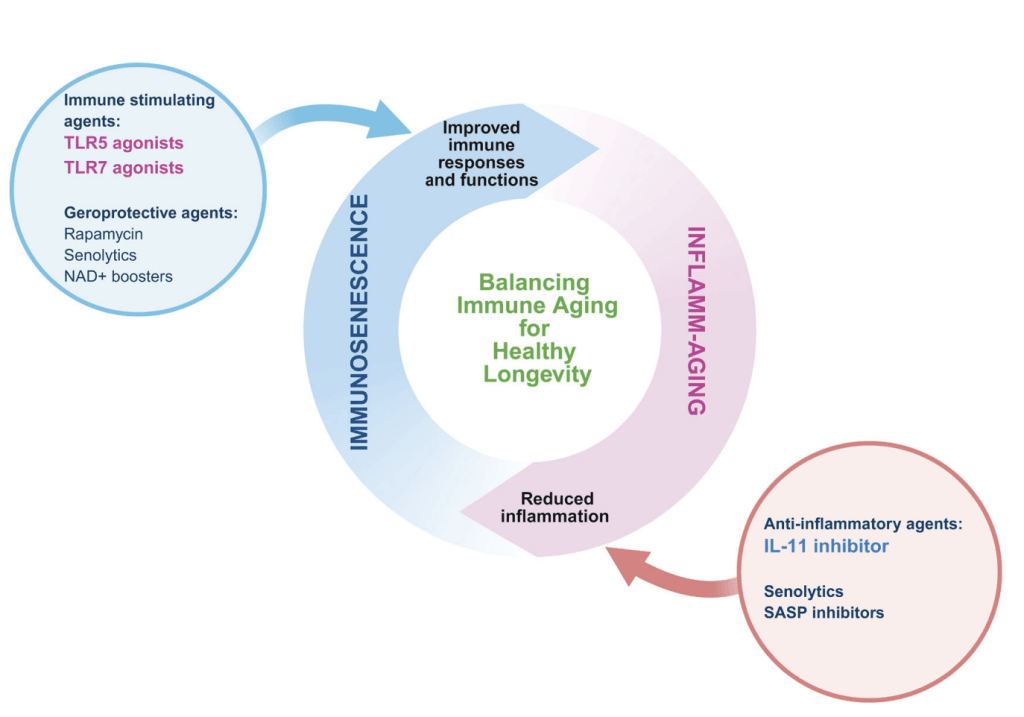Aging affects every part of our bodies, from the way our joints move to the way our skin looks. But one of the most important connections is between aging and the immune system, where time steadily weakens the body’s defenses. As we grow older, our immune defenses change in ways that make us more vulnerable to illness and chronic disease. Scientists call this process immunosenescence, and it often goes hand-in-hand with another phenomenon known as inflammaging—persistent, low-grade cellular inflammation.
It is not just true that our immune system declines as we age; the curiosity is that also, we age as our immune system declines.
These processes have recently been highlighted in a review published in Nature Reviews Molecular Cell Biology, which explores how immunosenescence and inflammaging are central to understanding aging and the immune system, as well as potential targets for therapies that could help us stay healthier for longer.¹
In this blog, we’ll explain what immunosenescence means, how the immune system declines with age (and vice versa), why inflammation plays such a big role in aging, and what this all means for long-term health and longevity
What Does Immunosenescence Mean?
Immunosenescence is the gradual decline of the immune system as we age. Think of your immune system as your body’s defense team. When you’re young, the team is energetic, coordinated, and full of fresh recruits ready to fight off new infections and other cellular threats. As you get older, fewer new recruits join the team, and many of the existing defenders become less efficient.
This means the immune system:
- Produces fewer new T cells, the cells responsible for fighting off new infections and even tumor cells.
- Builds up older, “experienced” immune cells that may not respond well to new threats.
- Struggles to keep balance between different types of immune responses, which is necessary to avoid low immunity but also over active immunity (such as auto-immune conditions).
The result is a weaker defense system that makes older adults more susceptible to infections, slower to fight off infections, less likely to survey and remove other threats like tumor cells, slower to respond to vaccines, and more likely to develop chronic diseases.²

At What Age Does the Immune System Decline?
There isn’t one exact birthday when the immune system suddenly changes; it’s a gradual process. Most people begin to experience noticeable shifts in their immune function around their 50s and 60s. That said, the rate and severity of decline depend on many factors, including genetics, lifestyle (aka epigenetics), stress, nutrition, and exposure to environmental toxins.
For example:
- The thymus gland, which trains new immune cells, starts shrinking as early as puberty.
- By midlife, the production of new T cells slows dramatically.
- Older adults often have fewer “naive” immune cells available to fight new viruses or bacteria.
This explains why infections such as influenza or COVID-19 can be more dangerous for older populations, and why vaccines sometimes provide less protection in later life.¹
Does the Immune System Weaken With Age?
Yes, research clearly shows that the immune system does weaken with age, but it doesn’t mean we’re powerless. Immunosenescence is a normal part of aging, but the pace and impact can vary widely from person to person.
Here’s what typically happens as the immune system grows weaker:
- Delayed response to infections: Older adults often get sick more easily and take longer to recover.
- Reduced vaccine effectiveness: Vaccines or natural infectious exposures may not “teach” the immune system as effectively.
- Higher risk of cancer: Weaker immune surveillance makes it harder to detect and destroy abnormal cells.
- More autoimmune issues: Sometimes, the immune system mistakenly attacks healthy tissue.
While these changes sound concerning, researchers are working on therapies to slow down immunosenescence and strengthen immune resilience in aging populations.¹
How Inflammation Ages You: The Role of Inflammaging
Another piece of the puzzle is inflammaging, a mix of “inflammation” and “aging.” Unlike the temporary inflammation you get from a cut or a cold, inflammaging is a constant, low-grade form of chronic cellular inflammation that builds up over time. And of course, the immune system is directly related to the control of inflammation we have.
This type of inflammation:
- Damages healthy cells and degenerates tissues.
- Contributes to conditions such as heart disease, diabetes, arthritis, and Alzheimer’s disease.
- Accelerates visible signs of aging, like wrinkles and slower wound healing.
Where does inflammaging come from? Scientists believe it’s fueled by several factors, including:
- Accumulation of damaged or senescent “zombie” cells that won’t die off.
- Imbalances in the gut microbiome.
- Continuous stress signals from the immune system.
In short, inflammaging is like a fire alarm that never turns off; eventually, the constant noise wears down the system.¹
Can We Slow Down Immunosenescence and Inflammaging?
The good news is that while aging can’t be stopped, there are ways to support your immune system and reduce unnecessary inflammation, thereby slowing the effective rate of biological aging:
- Healthy lifestyle habits: Regular exercise, balanced nutrition, and good sleep all strengthen immunity.
- Anti-inflammatory diets: Foods rich in antioxidants (like fruits, vegetables, and omega-3s) can help calm chronic inflammation. Phytonutrients are also key (from diverse fruits and vegetables).
- Stress management: Mindfulness, meditation, and reduced stress lower harmful immune activation.
Medical research: Scientists are studying therapies such as senolytics (which clear old, damaged cells) and immune-boosting treatments that will counteract immunosenescence and inflammaging directly.¹

Final Thoughts
Aging and the immune system are closely linked. Immunosenescence weakens the body’s ability to fight infections, while inflammaging silently damages cells and accelerates the onset of disease. Together, they create one of the greatest challenges in healthy aging and longevity
By understanding these processes, making healthier lifestyle choices, and staying informed about new medical breakthroughs, we can all take steps toward protecting our immune health and adding more quality years to life.


